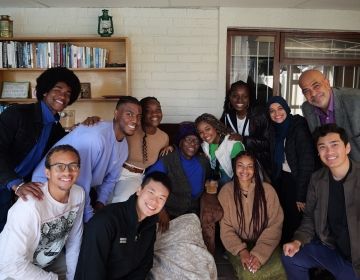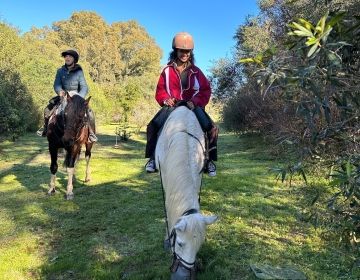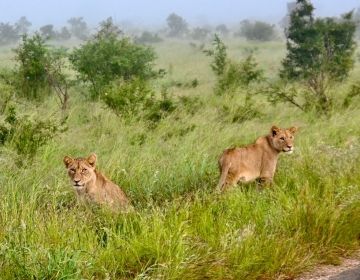"Decolonizing" myself through a journey in South Africa
About a year ago, I decided to go to South Africa and made my mom cry. Most of the things people knew about this country were so negative related to crime and poverty that going there alone wasn’t considered a great idea. Yet, my parents eventually let me go, prioritizing my dream over their massive anxiety, which I can’t be more than thankful for.
Arriving in Cape Town in the chilly and windy winter, I was more than excited to start a new chapter. Coldness wasn’t even my issue. Being exposed to many sides of Cape Town, I was kept getting attracted to everything it has to offer, especially its mesmerizing nature.
Waking up every morning to see mountains from the dorm was such an adrenaline pumper for me to start a day. The very first hike at Lions Head was the most memorable one, because the sunset I saw from the top just stole my heart. It made me feel I can spread my wings and fly as far as possible in this significant journey.

-This is a story about how I grew so much as an individual by “decolonizing” myself through great encounters and meaningful study.
While there was so much to see, I couldn't turn away from the reality this country faces. I began to realize how deep inequality is still implemented in the society. Since colonization and Apartheid created a hierarchy between white and non-white, the capital distribution based on race had been deeply applied in South African society.
Even after 26 years since the democracy finally started, injustice arisen from this gap is still visibly there. Lots of people still live in one room-like shacks with the whole family, share one tap with more than 20 people, and lack access to many things like quality education.
I heard and read a lot about Apartheid as a history, but it was not something in the past at all. When I visited one of the townships called Imizamo Yethu (“The struggle” in English), the woman who showed us around said,
“It is what it is, we have to keep going with our lives.”
She was looking at the other side of the area, where people live entirely differently with much bigger houses and better infrastructure. Even though the situation has been continuously changing, people with different skin colors have different experiences.

Witnessing lots of problems in and out of the campus, such as the Xenophobia attacks, gender-based violence, and black workers strikes, I was quite overwhelmed by how different issues this country holds and how they are complicatedly interrelated.
Studying in Humanities at UCT helped me understand this socio-political context, and try to make sense of what was actually happening. We learned how all these problems have different causes, yet they were always rooted in the ideology that colonization and Apartheid had created.
As students in the Humanities department, it was our interest and also our responsibility to seek for the solution to contribute to decolonizing the country. In the classes, It was quite interesting to see how each student had ideas based on their experience, as the race dynamics in the class populations were very diverse. The views from the students of different skin colors conflicted a lot, but the more friction was created, the more realistic and closer it became to the solution.
Despite this atmosphere, they were always respectful towards the opposing opinions, and they acknowledged the privilege of being able to have conversations like this in academia.

However, as I got exposed to racial discourses around myself, I started to have difficulties in how to position myself. Since the focus of the discussion was mostly on the experience of the gap between white and non-white, I had no idea how to engage in the conversation, having no experience as a South African.
I often felt out of place, thinking I do not deserve to state something or intervene as a completely third person.
Some of my friends who were exchange students from the US had gone through some harsh time as well. It was such a struggle for me not to be able to feel attached to any of what they experienced on a daily basis. But I didn't want to ignore or take it as someone eles' business. I became conscious and sensitive about how to interact with whom not to hurt somebody with my behavior.
Not belonging to any racial categories in a diverse South African society was quite challenging to me.
So I questioned myself many times, "why on earth I came here?"

Meanwhile, I met so many beautiful people from different communities. They inspired me a lot and eventually made me feel okay with how unique I am. All the people I became friends with in Cape Town were so open and kind to me regardless of who I was.
They had confidence in themselves and genuinely did what they love, yet being respectful to people with different backgrounds.

The word which one of my close friends from Kenya told me still remains in my heart. One day she said,
“People might say I am not meant to be at First Thursday because the culture to enjoy art is a white thing. People might say I am inferior because I am not from South Africa. But it’s just the way of thinking. Fearing from what people would say cannot stop you from doing what you like and being who you are”.
This kind of mindset motivated me to become confident in myself and to find my position as it is - being a Japanese coming with an American program and studying at South African university.

Also, I could apply the ideas and approaches of decolonization that I learned in the class to myself, which made me grow as an individual. The concept “intersectionality” I learned in a sociology class called "Race Class and Gender" helped me to deconstruct the stereotypes I had, even though it was used for the empowerment of the marginalized people in South Africa.
“Intersectionality” is about how an individual cannot be identified with one aspect, such as race, class and gender. One person holds a lot of elements which “intersect” with each other and this makes everyone’s experiences unique. The course was mainly about how black women were excluded from the decolonization movement in South Africa, as they were thought to have multiple disadvantages in the field of race and gender.
I am not a black woman, but it overlapped my position where I have some complexes like not being able to speak perfect English, not having the ideal physical features, and the list goes on.
This concept broadened my perspectives and challenged the stereotypes I tried to fit in. It freed me from who I thought I was supposed to be and let me embrace all the aspects of myself.

My favorite class from Theater and Performance also taught me a valuable lesson, especially as a dancer. In the course called "South African performance Genealogies", I learned how multiplicity could be seen in the theater and the dance performances in South Africa and how they are beyond specific categorizations like “××dance”.
Theater and dance have been playing significant roles in decolonization as they have the power to convey strong messages to people in response to social issues.
Modern artists are very creative, making the most out of “multiplicity” that South African diverse culture has created. I got to watch lots of performances, especially dance during my stay. I was fascinated by how the choreography, formation, and the transitions did not follow any existing templates like lines, circles, or symmetric forms.
They were just chaotic in a beautiful way.
This creativity helped me deconstruct the stereotypes I unconsciously implemented to my dancing and performing style. South African artists did not only tell the society to be free from any social constructions. They also told me not to find a spot to “fit in” but “TO BE” a spot.
I was delighted I could embody this idea in the performance from the dance class I joined.

Through meeting people full of confidence and respect, applying intersectionality in my personal life, and discovering multiplicity in my dance style, I found "new me" that I can love.
Decolonization movement seems unique to South Africa, but there are so many important lessons I could take away. This story is just a part of my whole experience in Cape Town, and there is still so much to unpack what Cape Town and its people have given me.
My exchange year ended up not being completed due to the coronavirus pandemic, but I just take it as an excuse for me to come back.
That is how much I fell in love with Cape Town.

Related Posts
Reflecting on South Africa as a Frederick Douglass Global Fellow
By: Sam Li Stepping off the plane in Cape Town felt like stepping into a whirlwind of vibrant energy, complex history, and breathtaking landscapes. This wasn't just any summer adventure... keep reading
Equestrian Getaway in Cape Town
Authored by Haroni Sahilu (she/her) (Haroni is a rising senior at Arizona State University, majoring in Philosophy and Justice Studies. During her time in Cape Town, she hopes to aid... keep reading
Wildlife Sightings on Safari Trip in Kruger National Park
Authored by Heather Wang (she/her) (Heather is a 2nd-year undergraduate student at Dartmouth College, majoring in Engineering Physics and Philosophy. She hopes to research astronomy and photometry during her time... keep reading



